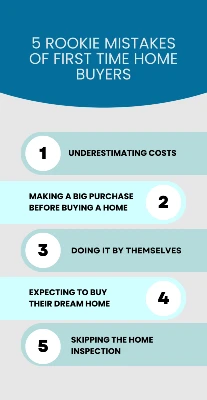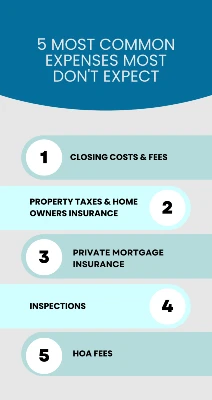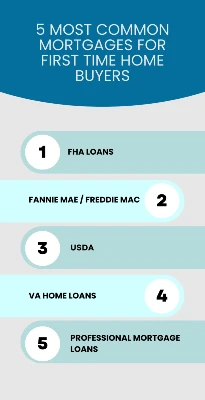Are you a first time home buyer looking for an easy to understand guide? Look no further!
This article will provide you with all the information and tips you need to make the home buying process smooth and stress-free.
We’ll cover five rookie mistakes to avoid, five items to look out for while touring homes, five expenses that may come up along the way, high level review of your mortgage options, and knowing home much home you can afford.
By following this guide, you can be sure your first experience as a homeowner is successful and fulfilling.
To listen to our Podcast version of this article, click below.
The Benefit of Being A First-Time Home Buyer
Buying houses has long been considered a key aspect in the American Dream.
If you do not have enough money to afford a 20% down payment, you’ll likely qualify for federal tax incentives or government-backed loan options.
This is the primary benefit of being a first time home buyer. However, these benefits also come with a cost but these cost do not discourage many people. The reason is that they decide buying is more advantages than renting due to the cost of renting!
5 Rookie Mistakes Of First-Time Home Buyers
Below are the most common mistake we see first-time home buyers make:
- Underestimating costs: This includes cost before, during, and after you buy the house. For example, closing costs on a loan, inspection fees, and moving costs. After the home is bought, we see first-time home buyers underestimate home maintenance costs, property taxes, and HOA fees. Its worth noting one more time, know your closing costs before house shopping. Also, after buying a house, your monthly payment for housing most likely will be higher than when you rented. Therefore, your emergency fund must increase. This is one of the most overlooked items I see from a personal finance standpoint that can quickly ruin your financial life.
- Making a big purchase before buying the home: Mortgages are approved based on a specific debt-to-income ratio (more on this below). In short, if you borrow money to buy something such as a car, its going to make it harder to qualify for a mortgage.
- Doing it by themselves: If this is the first time buying a house, don’t do it by yourself. Team up with a good real estate agent and mortgage broker to make sure you are doing everything correct. Also, be sure to work with a good mortgage broker that knows how to analyze if you should use mortgage points or not. One other item I want to note. I see many young home buyers using a real estate agent that is their friend. Most likely this person doesn’t have experience. You should only use them if they work with more experienced real estate agents and the other agent should be actively helping you, i.e. they should be part of a team. If your friend isn’t doing this, look for a different real estate agent.
- Expecting to buy your dream house: Your expectations for your first home shouldn’t be your dream home. If you happen to find it great but most likely you’ll have to compromise on a few items that are less important to you. Dream homes typically only come once you are able to build one.
- Skipping the home inspection: Pay for a home inspection from a quality inspector. I can’t tell you how many times people don’t pay for one or get a bad inspector and something major is missed. This can cost you a lot of money!

Items To Look For On A Home Tour
When you are visiting houses that your are thinking of buying, these are five common items to look into:
- What do you need near by? For example, are you having children? Are there good schools? Are you young and single and want it close to a “party scene?” Is it a good area now but have the demographics been changing such as crime rates increasing? How far will you have to travel for work? These are all vital things that you’ll want to take into account.
- The home’s structure, systems and scenery: Look at anything in the house that may cost money to fix such as appliances, flooring, landscaping, roof, etc.. You do not want to buy your first house then get stuck fixing expensive items.
- Water damage: This is a major cost to fix! Look for signs of water damage. If you see signs of damage, talk to a contractor before buying the house and try to get the seller to pay to fix it. If you do not know what water damage is look up pictures on the internet. Also, you may not see traditional markings of water damage, i.e. its been painted over. Look for paint on ceilings and walls that looks newer or different than similar color paint in the same area.
- Odor: Smells may come from carpets indicating they need to be replaced. Smells such as cigarette smoke or smells from certain cooking spices may be very hard and expensive to get rid of.
- Storage and space: I see first time home buyers get excited and buy a house just to realize there isn’t enough storage space. Then they are forced to either sell something they don’t want or store it and pay extra expenses. Also, measure your current furniture and make sure there is enough space for it. I see it all the time that people may have couches and family room furniture just to find out it won’t fit in their new space.
5 Most Common Expenses First Time Home Buyers Encounter That They Don’t Expect
Below are the most common costs that we see first time home buyers underestimate or worse yet, they don’t account for when they start the home buying process:
- Closing costs and fees: Be ready to spend several thousand dollars in closing costs. As a buyer, you’ll have to pay attorney’s fees, lender fees, appraisal fees, title fees and a recording fee just to put your home’s deed on file with the state.
- Property taxes and home owners insurance: Most first time home buyers have to set up an escrow account. This is where your loan servicer can pay your insurance premiums and tax payments for the life of your loan. All lenders require buyers to pay up to a year of homeowner’s insurance at closing.
- Private mortgage insurance (PMI): This monthly fee is for buyers who pay less than 20 percent of a down payment on their home. It reimburses the lender in case you default on your loan. The primary effect of mortgage insurance is that it increases your monthly mortgage payment.
- Inspections: You definitely want to get an inspection of the home before you buy it. This bill typically is around $1,000.
- HOA fees: If you are moving into a condo, sub-division, gated community, or many of the new build locations by home builders throughout the country, you’ll want to check to see what the homeowners association fees are for the neighborhood upkeep.

5 First Time Home Buyer Mortgage Options
Below is a review of common loans that you may use to buy your first house.
Two items to note before reviewing your home loan options. First, be sure to ask your real estate agent about closing cost assistance programs.
Second, be sure to ask your real estate agent or lender the minimum credit score requirements so you know what you may qualify for before home shopping. Raising your credit score may actually become part of your personal finance plan before even beginning the home buying search.
- FHA Loans: The Federal Housing Administration Loan (or FHA loans) is often referred to as the first time buyers loan because it is the most common. It requires only 3.5% down payment and has generous underwriting criteria, i.e. its relatively easy to qualify for verses other options. For example, you can have a lower credit score and qualify for these loans but you wouldn’t qualify for a conventional loan. The main disadvantage is that it will have a higher interest rate and closing costs relative to other options.
- Fannie Mae or Freddie Mac (Conventional Loans): These loans most of the time require a down payment of 10% or more on the purchase of the home. These have a lower interest rate than the first time buyers loan. In fact, they are known to be the best fixed rate mortgage. However, they are harder to qualify for and saving for the down payment is hard for many first time home buyers. In short, its easier to get a first time home buyers loan vs a conventional loan.
- USDA home loans: These loans require no down payment and have cheap mortgage insurance. However, you have to buy your first home in a rural area and meet income limits, i.e. your income can’t be higher than a certain amount. They are typically cheaper than first time home buyer loans but are harder to qualify for. The also offer a competitive interest rate relative to other loans.
- VA home loans: A VA loan allows active duty service members and veterans to finance a home with no down payment and no mortgage insurance. They are often extremely flexible in terms of qualifying for the loan and tend to have good interest rates. If you fall in this category then you’ll most likely use this loan for your first home purchase.
- Professional mortgage loan: A professional mortgage loan is a loan that is used by medical professionals, lawyers, and dentists. They tend to be relatively easy to qualify for and have a 0% to 3% down payment depending on your profession. However, they may be more costly to get relative to your other choices i.e. they may have higher interest rates than other choices. Those that are using this loan will definitely want to compare the interest rate and closing costs to the FHA first time buyers loan.
Bottom line when it comes to choosing your mortgage, do your due diligence and shop so you can get the best interest rate with the best fee structure!
You should also look at paying mortgage points. Paying points may get you a lower interest rate and mortgage payment & you may be able to get the seller to pay for points by negotiating them into the purchase price of the house.

Know Your Debt To Income Ratio
One of the first things you need to do before starting your home buying search is to know your debt-to-income ratio. It is one of the most important factors in qualifying for the various mortgages listed above.
This ratio adds all your monthly payments such as car loans, student loans, etc… and adds them to your mortgage payments.
For the purpose of calculating this ratio, your monthly payment includes your mortgage payment, property tax, home owners insurance, mortgage insurance, and HOA fees.
They then take that number as a percentage of your income.
Most mortgage lenders won’t go above a 42% DTI ratio. Also, the higher your ratio, the higher your interest rate will be.
Know Your Loan-To-Value Ratio
Your real estate agent should be helping you with this and your DTI ratio from day one.
The loan-to-value ratio, or LTV, is a ratio based on how much your mortgage is relative to the purchase price of your home.
For example, if the purchase price of a home is $500,000 and the loan is $482,500 then that is a 96.5% LTV ratio.
Another way of saying this would be that you put down 3.5% on the purchase price. This is what I mean when I reference the down payment requirements above.
Know The Type Of Interest Rate
Once you’ve calculated your debt-to-income ratio and loan-to-value ratio, it’s important to look at the type of interest rate available for first time home buyers.
There are two primary interest rate types for mortgages: Fixed interest rates and adjustable interest rates.
A fixed rate mortgage does not change during the life of the loan, i.e. you know what the rate will be forever and your monthly payment will not increase.
An adjustable interest rate mortgage will have a fluctuating rate which could increase or decrease your monthly payment through out the life of the loan.
Knowing How Much Mortgage You Can Afford
What you qualify for is not how much home you can afford. The biggest mistake I see first time home buyers make is buying too much home and then living paycheck to paycheck.
Most of the time, when a mortgage broker or lender tells you how much you qualify for, in reality you can afford about 70% to 90% of the amount.
For example, if they tell you that you qualify for a $500,000 loan, you typically can afford a loan between $350,000 and $450,000.
However, this doesn’t mean you shouldn’t buy a house if you need a $500,000 loan because your current rent might be so high it still makes since to buy.
Bottom line you need to make two key financial decisions before buying your first home:
- How much can you afford
- Should you rent vs buy
If you need help with these items, be sure to check out the awesome technology created at FitBUX. It will customize these answers based on your situation!
Be Prepared To Make An Offer Fast
In many places around the country there is low housing inventory. This means when homes go onto the market they sell quickly.
Therefore, you need to do your research starting months in advance.
This research should include knowing how much home you can afford, getting pre-qualified for a mortgage, visiting neighborhoods, and understanding comparable home prices for various neighborhoods you are looking in.
In addition, you’ll want to work with a lender that helps you do a market analysis such as Neo Home Loans.
Doing so will help you avoid mistakes such as putting in an offer, having it accepted, then the appraisal comes in too low. This is known as an appraisal gap is one of the big reasons why home purchases fall through.
Conclusion
Buying a home as a first time home buyer can be an overwhelming process. From understanding the different mortgage options available, to knowing how much you can realistically afford, there are many factors that need to be taken into consideration before making this big purchase. We’ve provided tips in this article. However, if you’d like more check out this article from real estate experts at Porch.com.
It is important to do your research and shop around for the best rates and terms that fit your budget.
Additionally, using tools such as FitBUX’s technology will help customize these decisions based on your individual situation so you get the most out of buying your first home!
With proper planning and preparation, you’ll soon find yourself in the perfect place to call “home”.

